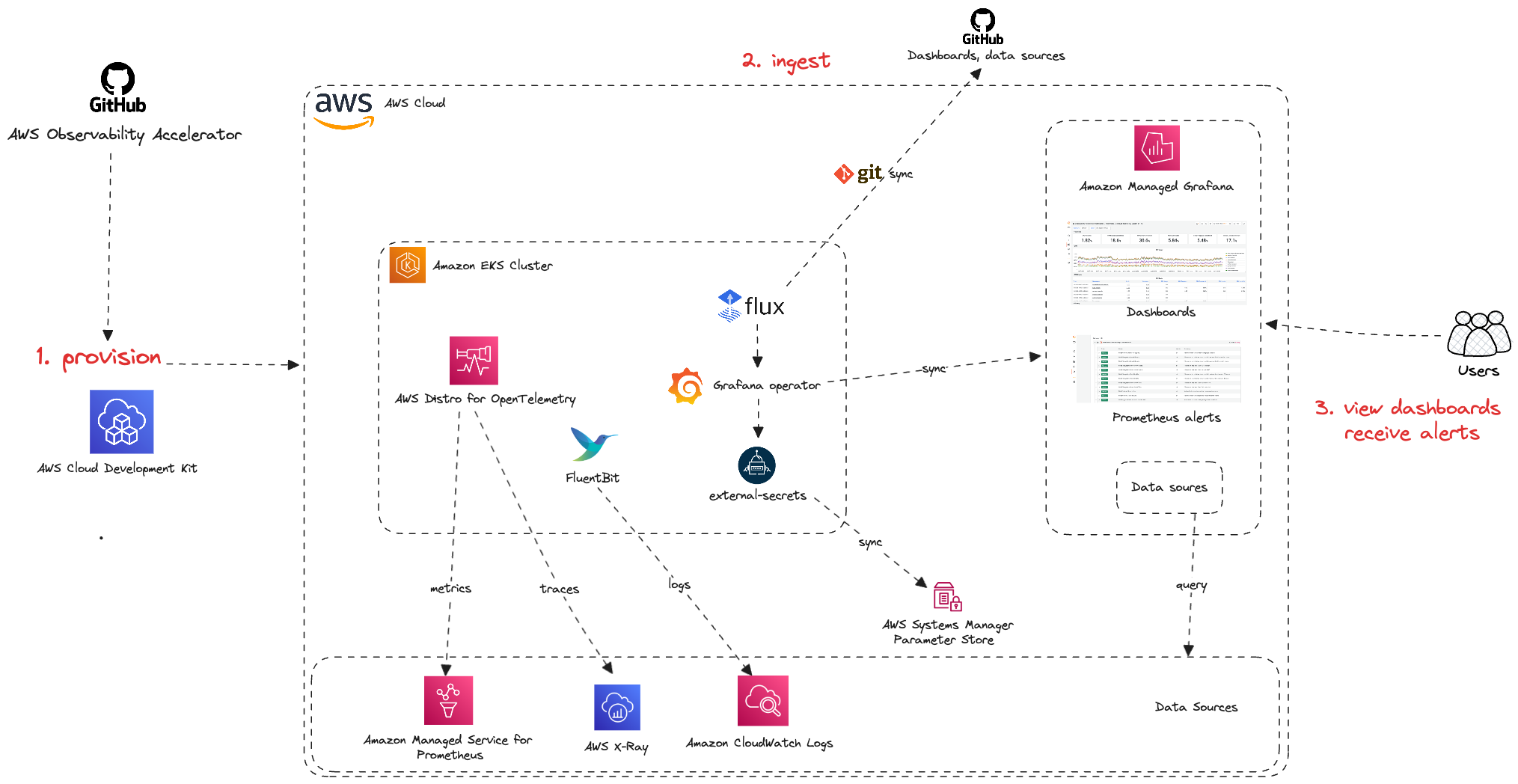AWS Observability Accelerator for CDK
Welcome to the AWS Observability Accelerator for CDK!
The AWS Observability Accelerator for CDK is a set of opinionated modules to help you set up observability for your AWS environments with AWS Native services and AWS-managed observability services such as Amazon Managed Service for Prometheus,Amazon Managed Grafana, AWS Distro for OpenTelemetry (ADOT) and Amazon CloudWatch.
We provide curated metrics, logs, traces collection, cloudwatch dashboard, alerting rules and Grafana dashboards for your EKS infrastructure, Java/JMX, NGINX based workloads and your custom applications.
Single EKS Cluster AWS Native Observability Accelerator
Single EKS Cluster Open Source Observability Accelerator
Patterns
The individual patterns can be found in the lib directory. Most of the patterns are self-explanatory, for some more complex examples please use this guide and docs/patterns directory for more information.
Usage
Before proceeding, make sure AWS CLI is installed on your machine.
To use the eks-blueprints and patterns module, you must have Node.js and npm installed. You will also use make and brew to simplify build and other common actions.
Ubuntu Setup
Follow the below steps to setup and leverage cdk-aws-observability-accelerator in your Ubuntu Linux machine.
-
Update the package list
Update the package list to ensure you're installing the latest versions.
sudo apt update
-
Install make
sudo apt install make
-
Install Node.js and npm
Install Node.js and npm using the NodeSource binary distributions.
curl -fsSL https://deb.nodesource.com/setup_20.x | sudo -E bash - &&\ sudo apt-get install -y nodejs
Note: The Node.js package from NodeSource includes npm
-
Verify Node.js and npm Installation
Check the installed version of Node.js:
node -v
The output should be
v20.x.x.Check the installed version of npm:
npm -v
The output should be a version greater than
9.7.x.If your npm version is not
9.7.xor above, update npm with the following command:sudo npm install -g npm@latest
Verify the installed version by running
npm -v. -
Install brew on ubuntu by following instructions as detailed in docs.brew.sh
/bin/bash -c "$(curl -fsSL https://raw.githubusercontent.com/Homebrew/install/HEAD/install.sh)"Add Homebrew to your PATH
test -d ~/.linuxbrew && eval "$(~/.linuxbrew/bin/brew shellenv)" test -d /home/linuxbrew/.linuxbrew && eval "$(/home/linuxbrew/.linux brew/bin/brew shellenv)" test -r ~/.bash_profile && echo "eval \"\$($(brew --prefix)/bin/brew shellenv)\"" >> ~/.bash_profile echo "eval \"\$($(brew --prefix)/bin/brew shellenv)\"" >> ~/.profile
Post completing the above, continue from Step: Repo setup
Mac Setup:
Follow the below steps to setup and leverage cdk-aws-observability-accelerator in your local Mac laptop.
- Install
makeandnodeusing brew
brew install make
brew install node
- Install
npm
sudo npm install -g n
sudo n stable
- Make sure the following pre-requisites are met:
- Node version is a current stable node version 18.x.
$ node -v
v20.3.1Update (provided Node version manager is installed): n stable. May require sudo.
- NPM version must be 8.4 or above:
$ npm -v
9.7.2Updating npm: sudo n stable where stable can also be a specific version above 8.4. May require sudo.
Repo setup
- Clone the
cdk-aws-observability-acceleratorrepository
git clone https://github.com/aws-observability/cdk-aws-observability-accelerator.git
PS: If you are contributing to this repo, please make sure to fork the repo, add your changes and create a PR against it.
- Once you have cloned the repo, you can open it using your favourite IDE and run the below commands to install the dependencies and build the existing patterns.
- Install project dependencies.
make deps
- To view patterns that are available to be deployed, execute the following:
make build
- To list the existing CDK AWS Observability Accelerator Patterns
make list
Note: Some patterns have a hard dependency on AWS Secrets (for example GitHub access tokens). Initially you will see errors complaining about lack of the required secrets. It is normal. At the bottom, it will show the list of patterns which can be deployed, in case the pattern you are looking for is not available, it is due to the hard dependency which can be fixed by following the docs specific to those patterns.
To work with patterns use:
$ make pattern <pattern-name> <list | deploy | synth | destroy>
Example:
$ make pattern single-new-eks-opensource-observability deploy
Patterns:
existing-eks-mixed-observability
existing-eks-opensource-observability
single-new-eks-awsnative-observability
single-new-eks-cluster
single-new-eks-graviton-opensource-observability
single-new-eks-mixed-observability
single-new-eks-opensource-observability
- Bootstrap your CDK environment.
npx cdk bootstrap
- You can then deploy a specific pattern with the following:
make pattern single-new-eks-opensource-observability deploy
Developer Flow
Modifications
All files are compiled to the dist folder including lib and bin directories. For iterative development (e.g. if you make a change to any of the patterns) make sure to run compile:
make compileThe compile command is optimized to build only modified files and is fast.
New Patterns
To create a new pattern, please follow these steps:
- Under lib create a folder for your pattern, such as
<pattern-name>-pattern. If you plan to create a set of patterns that represent a particular subdomain, e.g.securityorhardening, please create an issue to discuss it first. If approved, you will be able to create a folder with your subdomain name and group your pattern constructs under it. - Blueprints generally don't require a specific class, however we use a convention of wrapping each pattern in a plain class like
<Pattern-Name>Pattern. This class is generally placed inindex.tsunder your pattern folder. - Once the pattern implementation is ready, you need to include it in the list of the patterns by creating a file
bin/<pattern-name>.ts. The implementation of this file is very light, and it is done to allow patterns to run independently.
Example simple synchronous pattern:
import SingleNewEksOpenSourceobservabilityPattern from '../lib/single-new-eks-opensource-observability-pattern';
import { configureApp } from '../lib/common/construct-utils';
const app = configureApp();
new SingleNewEksOpenSourceobservabilityPattern(app, 'single-new-eks-opensource');
// configureApp() will create app and configure loggers and perform other prep stepsSecurity
See CONTRIBUTING for more information.
License
This library is licensed under the MIT-0 License. See the LICENSE file.

